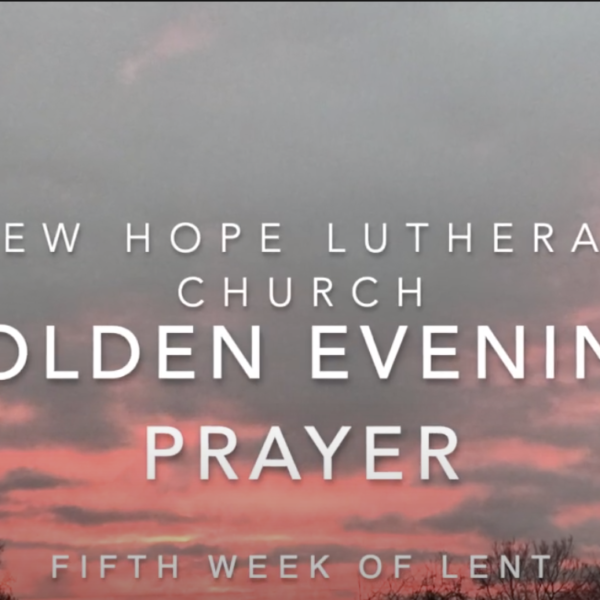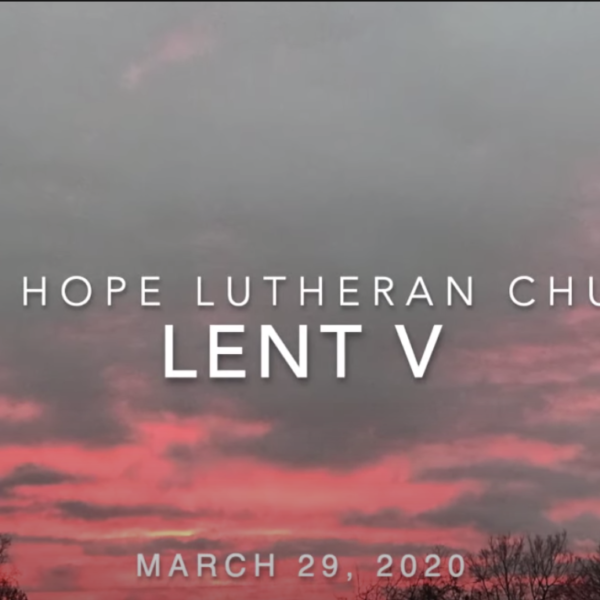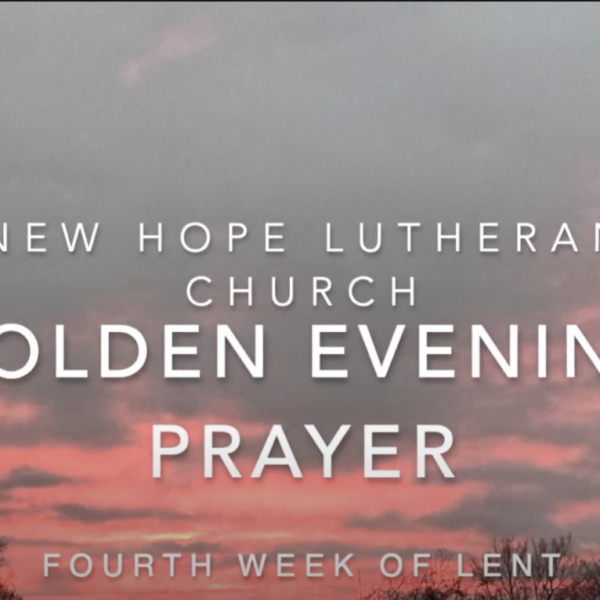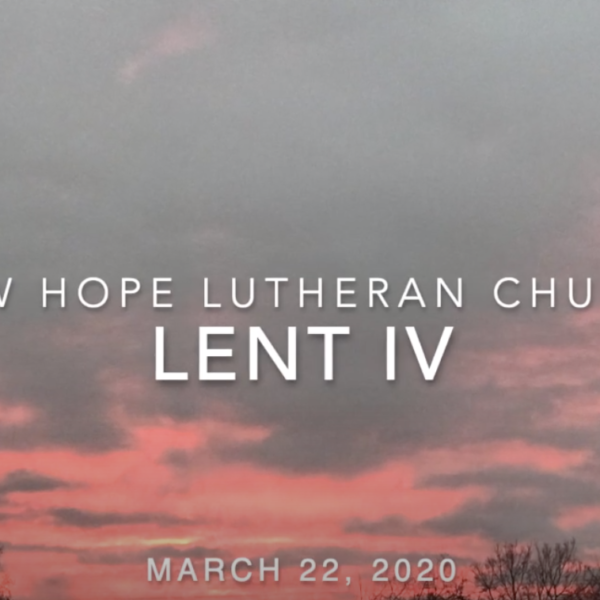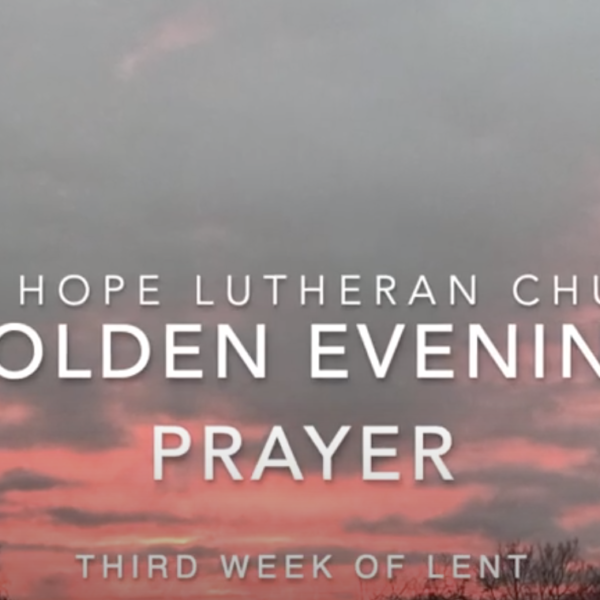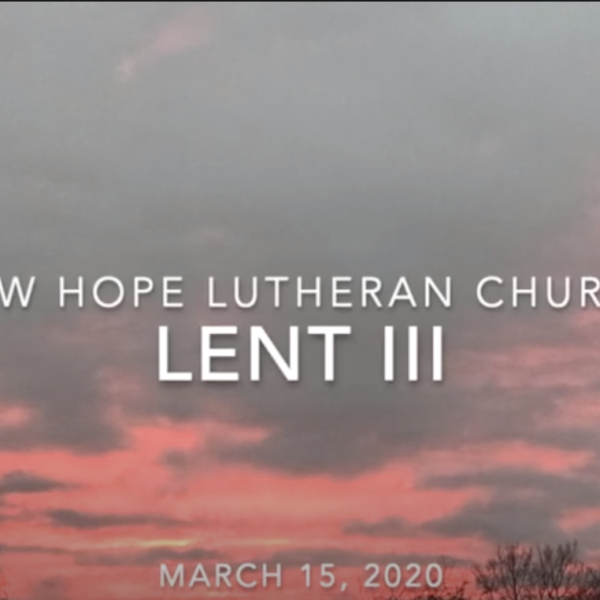Lent V – 2020
John 11:1-45
1 Now a certain man was ill, Lazarus of Bethany, which was the village of Mary and her sister Martha. 2 Mary was the one who anointed the Lord with perfume and wiped his feet with her hair; it was her brother Lazarus who was ill. 3 So the sisters sent a message to Jesus, “Lord, the one whom you love is ill.” 4 But when Jesus heard it, he said, “This illness does not lead to death; rather it is for God’s glory, so that the Son of God may be glorified through it.” 5 Accordingly, though Jesus loved Martha and her sister and Lazarus, 6 after having heard that Lazarus was ill, he stayed two days longer in the place where he was.
7 Then after this he said to the disciples, “Let us go to Judea again.” 8 The disciples said to him, “Rabbi, the Judeans were just now trying to stone you, and are you going there again?” 9 Jesus answered, “Are there not twelve hours of daylight? Those who walk during the day do not stumble, because they see the light of this world. 10 But those who walk at night stumble, because the light is not in them.” 11 After saying this, he told them, “Our friend Lazarus has fallen asleep, but I am going there to awaken him.” 12 The disciples said to him, “Lord, if he has fallen asleep, he will be all right.” 13 Jesus, however, had been speaking about his death, but they thought that he was referring merely to sleep. 14 Then Jesus told them plainly, “Lazarus is dead. 15 For your sake I am glad I was not there, so that you may come to trust. But let us go to him.” 16 Thomas, who was called the Twin, said to the other disciples, “Let us also go, that we may die with him.”
17 When Jesus arrived, he found that Lazarus had already been in the tomb four days. 18 Now Bethany was near Jerusalem, some two miles away, 19 and many of the Judeans had come to Martha and Mary to console them about their brother. 20 When Martha heard that Jesus was coming, she went and met him, while Mary stayed at home. 21 Martha said to Jesus, “Lord, if you had been here, my brother would not have died. 22 But even now I know that whatever you ask of God, God will give you.” 23 Jesus said to her, “Your brother will rise again.” 24 Martha said to him, “I know that he will rise again in the resurrection on the last day.” 25 Jesus said to her, “I am the resurrection and the life. Those who trust in me, even though they die, will live, 26 and everyone who lives and trusts in me will never die. Do you believe this?” 27 She said to him, “Yes, Lord, I believe that you are the Messiah, the Son of God, the one coming into the world.”
28 When she had said this, she went back and called her sister Mary, and told her privately, “The Rabbi is here and is calling for you.” 29 And when Mary heard it, she got up quickly and went to him. 30 Now Jesus had not yet come to the village, but was still at the place where Martha had met him. 31 The Judeans who were with Mary in the house, consoling her, saw Mary get up quickly and go out. They followed her because they thought that she was going to the tomb to weep there.
32 When Mary came where Jesus was and saw him, she knelt at his feet and said to him, “Lord, if you had been here, my brother would not have died.” 33 When Jesus saw her weeping, and the Judeans who came with her also weeping, he was greatly disturbed in spirit and deeply moved. 34 He said, “Where have you laid him?” They said to him, “Lord, come and see.” 35 Jesus began to weep. 36 So the Judeans said, “See how he loved Lazarus!” 37 But some of them said, “Could not he, the one who opened the eyes of the blind man have kept this man from dying?”
38 Then Jesus, again greatly disturbed, came to the tomb. It was a cave, and a stone was lying against it. 39 Jesus said, “Take away the stone.” Martha, the sister of the dead man, said to him, “Lord, already there is a stench because he has been dead four days.” 40 Jesus said to her, “Did I not tell you that if you trusted, you would see the glory of God?” 41 So they took away the stone. And Jesus looked upward and said, “Father, I thank you for having heard me. 42 I knew that you always hear me, but I have said this for the sake of the crowd standing here, so that they may believe that you sent me.” 43 When Jesus had said this, he cried with a loud voice, “Lazarus, come out!” 44 The dead man came out, his hands and feet bound with strips of cloth, and his face wrapped in a cloth. Jesus said to them, “Unbind him, and let him go.”
45 Many of the Judeans therefore, who had come with Mary and had seen what Jesus did, believed in him.
—————
Please pray with me this morning, church:
God of resurrection,
Call us out from our graves.
Unbind us.
In the midst of our fears and worries and anxieties and doubts,
Help us to breathe.
Amen.
—————
Church, how are we doing?
If you’re keeping score at home, we’re on Day 4 of the Fort Bend County “Stay Home to Save Lives” order. Day 15 of CDC-recommended social—or as I prefer to call it, physical—distancing. (Because really the idea is to stay physically distant, but in truth, we really must maintain our social connections to one another as best we can…) And Day 20-something of feeling truly under threat from this COVID-19 pandemic…
So how’s your quarantine going, church?
If you’re like me, quite honestly, you feel a bit like Lazarus…stuck in a tomb. Whether the tomb is your house, or the gazillion things you find on your to-do list, or even if it’s just the threat of this pandemic that has you feeling like you’re holed up and sealed off with only your own fear and anxiety to keep you company…I bet the tomb feels real to you this morning. I bet you can imagine what being sealed off in darkness looks like and feels like.
And…depending on how seriously you’re taking your hygiene habits during these days of quarantine and distancing and isolation from others…because let’s be honest, who are you really going to interact with during a quarantine??…depending on your habits during this quarantine, maybe you feel, or at least smell, like Lazarus…like you’ve been dead for 4 days… I love the King James Version’s translation of Martha in verse 39. The KJV says, “My Lord, he stinketh…” I wonder if your new co-workers would say that about you. “My Lord, they stinketh…”
Seriously though, take a shower. Stay clean and healthy and hydrated. And for the love of all things holy, wash your hands!
The thing is, I think we know very well what a tomb feels like these days. Maybe you feel like the dry bones from Ezekiel—dried up and like you’ve lost all hope…cut off completely… Uhh, hello…? Quarantine and isolation, anyone…? I think we know what that feels like. I think we’re acquainted with the grief shown by Martha and Mary, and even Jesus. I think we can identify with that pain. If not the grief and pain just yet, certainly the fear and anxiety…which lead to grief and pain…they’re sisters, you see?
I mean, do you hear the agony and pain in Martha’s and Mary’s words? “Lord…if you had been here…our brother would not have died..” If you had come when we first sent word…we told you he was sick…what did you think was going to happen…?
I feel like I’m always saying that this is my favorite bible story or that’s my favorite bible story…but I really like this story from the gospel of John. Because talk about complicated family dynamics. Mary, Martha, and Lazarus…they were really close with Jesus, the author writes that Jesus loved them, they were all really close friends. And so when Martha lobs this accusation at Jesus, it didn’t just glance off. It couldn’t have. I mean, these were words meant to wound and injure, and I think they probably did. “Lord, if you had been here, my brother would not have died.” The meaning behind these words being, of course, “How dare you walk up like everything’s ok. We told you Lazarus was dying and you stayed where you were and you didn’t come here immediately, and Lazarus died because of you.”
How often do we use words that are meant to wound and injure with our family members? How often do we use words to try and make others feel as hurt and as pained as we do?
As we live into our new normal of sheltering at home and severely restricting our interactions with others, do you find yourself getting short with your family members? Are you managing your anxiety and fear so that you don’t put all that stuff on your family who you suddenly find yourself spending a lot more time with?
And so, it’s in the midst of this grief and anger and pain, that Mary and Martha and Jesus and all the folks gathered with them, they go to the tomb and Jesus stands outside it, and then the shortest verse in the Bible, John 11:35: “Jesus wept.”
Over and over again, the gospel of John tries to convince you that Jesus has it all together and there’s this great plan and Jesus knows exactly what he’s doing and exactly what he has to do…but here, in this moment, you get a peek behind the curtain. This death—Lazarus’ death—pains Jesus. He was greatly disturbed…deeply moved… Jesus has to be wondering if what Martha and Mary said was true…”If I would have been here…would Lazarus still be alive?”
That’s the thing about pain, we’re pain-averse creatures…we don’t like it. And so when we experience pain and hurt, we feel very strongly that the ones who caused us this pain and hurt should feel exactly like we feel…worse even, they should feel worse than we do.
When we operate out of a place of pain, we seek to transmit that pain and put it on others. The same is true of fear and anxiety…when we don’t manage them well, we bring others into our cyclone of fear and anxiety, we actually catch others up in this really damaging spiral, and it ends up hurting them.
So how do we manage these things? How do you make sure that when you’re feeling well acquainted with the tomb, when you feel like your fear and anxiety have kept you buried for 4 days or even longer, how can you be sure not to catch others up in this?
Well, for starters, I think breathing is essential.
Fort Bend County’s stay-at-home orders explicitly mention that getting outside and going on walks are not prohibited. In fact, they’re encouraged. It’s the breath—God’s breath—that gives life to the dry bones in Ezekiel. It’s the wind…the Hebrew word Ruach—interestingly Ruach means both wind and breath and spirit—it’s God’s breath…that will restore life to your worn out and dried up bones. Go outside and breathe deep. Take in the spring pollen. Let it fill up your eyeballs and nostrils. Let it fill up your lungs. Notice your breath.
Unbind yourself. Lazarus didn’t come out of the tomb looking like a spring chicken, and he certainly didn’t smell like one. Jesus said, “Unbind him…and let him go…” Church, cast off your grave-clothes. Loosen and shake off those things that bind you up, those things that keep you locked away and sealed up in your graves. Set down those things that are not yours to carry. Lighten your load.
And connect. Be drawn together like muscles and tendons and sinews laid upon bones that are being joined back together. We keep emphasizing connection and cultivating and nurturing these relationships, because, by God, they’re important. We need people who love us…who deeply love us…who will call us out of our graves. Who will help pull us out of the dark places we find ourselves…who will help unbind and loosen our grave clothes…who won’t care too much that we stinketh…but who will lovingly encourage us to go take a shower and wash our hair. It’s the point of all these check-ins we’ve scheduled and the phone calls and texts I’m encouraging you to make and send…because we are connected, and I need you to realize that.
I need you to trust me that this, too…being and staying connected…is vital to your health and well-being.
Call someone.
Text them.
Reach out.
Join our Zoom chats.
Go outside. Walk.
Wave to your neighbor from at least 6 feet away.
You are the body the Christ…and we are being broken open for the sake of the world.
Lent IV – 2020
John 9:1-41
1 As Jesus walked along, he saw a man blind from birth. 2 His disciples asked him, “Rabbi, who sinned, this man or his parents, that he was born blind?” 3 Jesus answered, “Neither this man nor his parents sinned; he was born blind so that God’s works might be revealed in him. 4 We must work the works of the one who sent me while it is day; night is coming when no one can work. 5 As long as I am in the world, I am the light of the world.” 6 When Jesus had said this, he spat on the ground and made mud with the saliva and spread the mud on the man’s eyes, 7 saying to him, “Go, wash in the pool of Siloam” (which means Sent). Then he went and washed and came back able to see. 8 The neighbors and those who had seen him before as a beggar began to ask, “Is this not the man who used to sit and beg?” 9 Some were saying, “It is he.” Others were saying, “No, but it is someone like him.” He kept saying, “I am the man.” 10 But they kept asking him, “Then how were your eyes opened?” 11 He answered, “The man called Jesus made mud, spread it on my eyes, and said to me, ‘Go to Siloam and wash.’ Then I went and washed and received my sight.” 12 They said to him, “Where is he?” He said, “I do not know.”
13 They brought to the Pharisees the man who had formerly been blind. 14 Now it was a sabbath day when Jesus made the mud and opened his eyes. 15 Then the Pharisees also began to ask him how he had received his sight. He said to them, “He put mud on my eyes. Then I washed, and now I see.” 16 Some of the Pharisees said, “This man is not from God, for he does not observe the sabbath.” But others said, “How can a man who is a sinner perform such signs?” And they were divided. 17 So they said again to the blind man, “What do you say about him? It was your eyes he opened.” He said, “He is a prophet.”
18 The Judeans did not believe that he had been blind and had received his sight until they called the parents of the man who had received his sight 19 and asked them, “Is this your son, who you say was born blind? How then does he now see?” 20 His parents answered, “We know that this is our son, and that he was born blind; 21 but we do not know how it is that now he sees, nor do we know who opened his eyes. Ask him; he is of age. He will speak for himself.” 22 His parents said this because they were afraid of the Judeans; who had already agreed that anyone who confessed Jesus to be the Messiah would be put out of the synagogue. 23 Therefore his parents said, “He is of age; ask him.”
24 So for the second time they called the man who had been blind, and they said to him, “Give glory to God! We know that this man is a sinner.” 25 He answered, “I do not know whether he is a sinner. One thing I do know, that though I was blind, now I see.” 26 They said to him, “What did he do to you? How did he open your eyes?” 27 He answered them, “I have told you already, and you would not listen. Why do you want to hear it again? Do you also want to become his disciples?” 28 Then they reviled him, saying, “You are his disciple, but we are disciples of Moses. 29 We know that God has spoken to Moses, but as for this person, we do not know where he comes from.” 30 The man answered, “Here is an astonishing thing! You do not know where he comes from, and yet he opened my eyes. 31 We know that God does not listen to sinners, but does listen to anyone who is devout and obeys God’s will. 32 Never since the world began has it been heard that anyone opened the eyes of someone born blind. 33 If this person were not from God, he could do nothing.” 34 They answered him, “You were born entirely in sins, and are you trying to teach us?” And they drove him out.
35 Jesus heard that they had driven him out, and when he found him, he said, “Do you believe in the Son-of-Man?” 36 He answered, “And who is he, sir? Tell me, so that I may believe in him.” 37 Jesus said to him, “You have seen him, and he is the one speaking with you.” 38 He said, “Lord, I believe.” And he worshiped Jesus. 39 Jesus said, “I came into this world for judgment so that those who do not see may see, and those who do see may become blind.” 40 Some of the Pharisees near Jesus heard this and said to him, “Surely we are not blind, are we?” 41 Jesus said to them, “If you were blind, you would not have sin. But now that you say, ‘We see,’ your sin remains.”
—————
Please pray with me this morning, church:
Healing God,
Calm our restless spirits during this extraordinary time.
Draw us near to you,
And help us to connect though we are physically distant.
Heal this hurting world.
Immanuel—be with us.
Amen.
—————
One of my seminary professors is a brilliant preacher and homiletics professor. He’s now the Bishop of the North/West Lower Michigan Synod of the ELCA. He’s also legally blind and has never seen “normally”, in his words.
He hates this story from the gospel of John.
Like, hates it, hates it.
He says something to the effect of, “I’ve never seen in a way that folks would call ‘normal’ so I don’t know what that means. My inability to see is part of me, it’s who I am. And so, in the great resurrection of all things, when all things are finally reconciled back to God in their fullness, will I still be blind? I should certainly hope so! If the resurrection of the body means that our bodies become most fully themselves in their most perfect forms, I should think that my most perfect form is some perfect form of me with my blindness. My inability to see is just as much a part of me as my hands or my feet or the fact that I’m a pastor or my identity as a baptized and beloved child of God. I don’t believe God’s desire is to ‘cure’ me of my blindness.”
Bishop Satterlee says, “Heaven isn’t a place where I can see. Heaven is a place where it doesn’t matter that I can’t.”
It’s certainly a different take on our gospel story this morning and one that has forever changed how I hear this encounter between Jesus and the man born blind.
Because so often I think we hear this story as a story of healing, a story about Jesus the miracle worker…but I don’t think the recovery of sight is the most compelling part of this story.
See, I think the mud…is the most important part of our gospel this morning.
I wonder at what point in our lives did mud stop being something to play in and something to enjoy. When did mud become something to avoid, something not desirable, maybe even something to be feared? Mud is sticky. It clings to clothes and skin. Mud obscures. It covers up and hides. But in this case, mud is healing. Mud is used as a vessel for new life.
And by the way, I don’t think the CDC would have approved of Jesus’ methods here. Like, there is absolutely nothing about rubbing your spit on someone else’s eyes that falls within best practices during a pandemic. To say nothing of the fact that Jesus and the man were certainly not at least 6 feet apart from each other. But anyway…
The thing is, I think we can relate to this muddy situation. I think over the past few weeks, if you’re like me, the COVID-19 outbreak and this pandemic have felt like mud layering on top of mud…as if you’re being dragged down and covered up with sticky, dirty, thick, obscuring mud. With rules and regulations and guidelines piling up, gatherings being restricted further and further, trying to figure out what working from home even looks like, suddenly finding yourself thrown headfirst into a new vocation as a homeschool teacher… Do we have enough food? What about our prescriptions? What if I actually need toilet paper? How can I even think about work when the only thing my mind keeps coming back to is how can I keep my family and myself safe…?
Church, Jesus doesn’t leave this man with mud on his eyes.
Remember what I said…the mud is a vessel for new life. The grit and grime and muck are the medium through which sight is restored and new life is brought forth. Jesus tells this man to go wash off in the pool of Siloam and then his sight is restored. We are not left in the mud. Muck and grime…anxiety, worry, doubt, and fear…that is not where we are left, by God. The Gospel truth is that the mucky, grimy, worrisome, doubtful, and fearful places are where we are found…but through grace and love, God does not leave us there.
The Psalmist reminds us, it is the Lord who is our shepherd. Contrary to everything you’ve ever heard about bootstraps, we don’t get ourselves out of the muck. It is the Lord that makes you to lie down in green pastures and who leads you beside still waters. Even though you walk through the darkest valley, even the valley of the shadow of death…even the valley and the wilderness of a pandemic that is frightening…even and especially there, God is with you.
God is with you, God leads you when you are in the midst of that valley…when it feels like the mud has never been thicker…when it feels like you might never be able to open your eyes again…
The good news, church, is that we cannot lead ourselves out of the wilderness places in which we find ourselves…even this wilderness…God leads us…God shepherds us…
Jesus’ disciples, at the very beginning of this story, ask him, “Rabbi, who sinned, this man or his parents, that he was born blind?” And Jesus’ response to them is, “Neither…neither this man nor his parents sinned…this man was born blind so that God’s works might be revealed in him.”
Church, how are God’s works being revealed through you during this time?
How are you showing up to be the hands and feet and heart of Christ in this extraordinary moment?
I truly want to hear from you. After washing the mud off his eyes, this man kept saying over and over and over again, to anyone and everyone who would listen, and even those that wouldn’t, he kept telling his story, that it was Jesus who did this, Jesus did this extraordinary thing. This man witnessed to what he experienced in the love and mercy of Jesus. This man told his story.
What’s your story, church?
Tell me, tell us…tell your story. Comment on Facebook or YouTube…send me an email, send me a text…this is a time for sharing and telling our stories.
How are you showing God’s love during this pandemic? Are you sewing hospital masks for our underresourced medical facilities? Are you running errands for your immuno-compromised neighbor? Are you making beautiful art or music? Are you gardening?
Tell us your story.
How are you helping to wipe away some of the mud from this grimy, gritty, mucky time?
How are you being a vessel for healing and new life?
Where do you see God showing up?
Peace be yours this week, church.
I keep holding all of you in my prayers.
Keep lifting one another up. Pray for each other. Help each other.
Stay connected in these times of physical separation.
God knows we need it.

